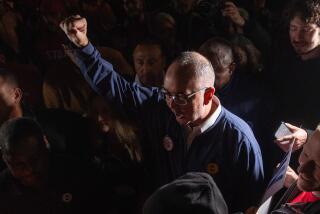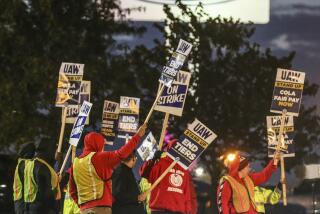Illinois Firestone Plant Torn by Labor Tension, Tire Recall
DECATUR, Ill. — This heartland city of 90,000, which boasts of being the “Pride of the Prairie” on a sign at the edge of town, finds itself in the midst of a debacle that is making no one proud.
Bridgestone/Firestone Inc., which has announced an immense recall following reports of deadly accidents caused by tire failures, fingered its plant here for making a disproportionate share of the suspect tires.
Embarrassed plant workers and union representatives say they have been unjustly stigmatized. They say they follow the same designs and specifications as other Bridgestone plants. And they say the company hasn’t shared the data on which the conclusion is based.
“We feel that our workers are as qualified and safety-conscious as any worker in the world,” said Harland Smith, a 32-year veteran of the plant and officer of United Steelworkers of America Local 713.
“It is unfair to single out one particular plant when more than one plant has made” the tires, complained Roger Mallory, another longtime employee. “That’s probably a corporate decision: Sacrifice one to save the rest.”
The flap threatens to roil already sensitive negotiations between Bridgestone and the 1,800 union employees, who have worked without a contract since spring and have been picketing the plant on a daily basis.
It has also kindled hushed speculation about possible links between the tire problem and a bitter strike in 1994. Inexperienced replacement workers filled many jobs at the plant, and the dispute wasn’t fully resolved until a new contract was signed in 1996--about the time the Decatur plant began making some of the tires that are being recalled.
A company spokesman said Friday there is no connection, because “all of the people who work at our plants are thoroughly trained in how to create [a] quality product.”
But some workers speculate that if there were quality problems, they may have been linked to massive turnover and inexperience in the aftermath of the strike.
Most of the 6.5 million tires Bridgestone has offered to replace were original equipment on Ford’s Explorer sport-utility vehicles and other Ford, Mercury and Mazda SUVs and light trucks.
The recall involves about 3.8 million Firestone ATX and ATX II tires in size P235/75R15, produced in Decatur and at five other plants; and the 2.7 million Firestone Wilderness AT tires, size P235/75R15, made in Decatur.
The latter model was also produced elsewhere, but Bridgestone said it is recalling only the Decatur-produced Wilderness tires, because they are “overrepresented” in incident reports of shredded tires.
Altogether, the National Highway Traffic Safety Administration has received about 300 reports of those tire models failing, resulting in dozens of injuries and at least 46 deaths.
To be sure, Bridgestone has said it doesn’t believe any of these tires are actually defective, much less that the Decatur plant made defective tires. While the NHTSA continues a defect investigation, the company has bowed to pressure and ordered the recall as a precaution.
Nonetheless, many Decatur workers said that they feel unfairly singled out, and that if problems exist, they most likely involve the design of the tires or the Ford vehicles that use them.
Ford Explorers have been involved in many of the tire-shredding reports. And it was disclosed this week that while Bridgestone has recommended the tires be inflated to 30 pounds per square inch, Ford had advised Explorer owners to maintain the tires at 26 psi--until this week, that is, when the auto maker amended its recommendation to a range of 26 psi to 30 psi.
Although the significance of the difference is uncertain, experts say lower tire inflation would tend to put more stress and heat on tires riding at highway speeds, making them more likely to fail. And Smith, the union officer, noted that tire testing and grading procedures at the Bridgestone plant are based on the company’s recommendation of 30 psi.
While mainly used to commute and run errands, the Explorer and other SUVs are built high off the ground to dodge ruts and rocks on the dirt roads they rarely see. But accident statistics show that their high center of gravity makes them more prone to roll over in quick steering maneuvers than ordinary passenger cars.
Ford has said it advised the lower tire pressures to provide a smoother, more car-like ride on the vehicles’ stiff truck frames. But experts say lower tire pressures also would enhance the stability of the vehicles and reduce the rollover risk. Ford spokesman Mike Vaughn said Friday that the stability issue “may have been” another reason for recommending the lower tire pressures.
Bridgestone spokesman Ken Fields said the firm would not second-guess Ford’s advice on tire inflation and said there was no significant difference between Bridgestone and Ford’s current range of 26 to 30 psi.
But some workers here said they believed that any problems with the tire were aggravated, if not caused, by their use on Explorers. “I think Ford needs to take some responsibility,” Mallory said.
Union Support Strong in Decatur
About midway between Chicago and St. Louis, Decatur is surrounded by corn and soybean fields. But it is a factory town with plants of such giants as Caterpillar Inc. and Archer-Daniels-Midland Co., along with that of Bridgestone.
The tire firm’s sprawling, red-brick factory has been a major fixture since it opened in 1963. Its civic role includes sponsorship of the Decatur Junior Football League, which has a playing field and grandstands on what is basically the plant’s front lawn.
The city is also a union stronghold. Friday morning, as a small group of tire plant pickets sought the shade of trees in front of the plant, cars and pickups came whizzing by with horn-honking shows of support.
One of the pickets, Edward Lucas, 60, who has worked at the plant for 35 years, said the company and workers had better stick together to ride out the recall storm.
“We’re not blaming the company, and I don’t think the company is blaming us,” he said. “Job quality comes first . . . because we also carry our families around on Firestone tires.”
Nearby, several members of the grain millers’ union, just off the night shift at Archer-Daniels-Midland, stated their firm conviction that if there had been quality problems at the Bridgestone plant, the inexperience of replacement workers was to blame. “Scab labor--that’s what it is,” one said.
Sipping a beer at the Sundown Lounge, a watering hole near the Bridgestone plant, a veteran tire worker who would not give his name said he believed the tires produced at the plant are as good as any made.
But he said that may not have been the case in the aftermath of the strike. “You had such a tremendous turnover,” he said. At the time, “I wouldn’t have let my son get a set of Firestone tires.”
More to Read
Inside the business of entertainment
The Wide Shot brings you news, analysis and insights on everything from streaming wars to production — and what it all means for the future.
You may occasionally receive promotional content from the Los Angeles Times.










